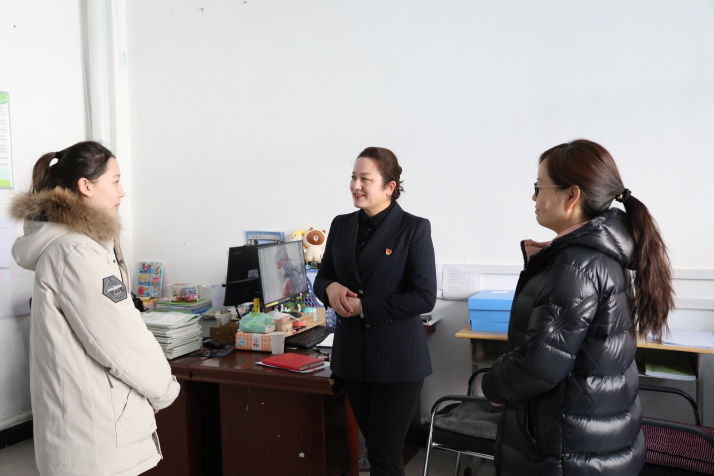| China |
| A school principal and NPC deputy sheds light on the changes and hopes in Xinjiang's education | |
|
|
 Min Xiaoqing, principal of the Sixth Middle School in Tacheng City, Xinjiang Uygur Autonomous Region, talks to a student on December 22, 2023 (COURTESY PHOTO)
Having been elected as a deputy to the National People's Congress (NPC), China's top legislature that is elected for a term of five years and convenes once a year, for a second term last year, Min Xiaoqing once more finds herself in Beijing to attend the NPC's annual session, which commenced on March 5. As principal of the Sixth Middle School in Tacheng City, northwest China's Xinjiang Uygur Autonomous Region, Min is bringing the people's voices on education from Xinjiang to Beijing. Her proposals to the NPC sessions have always focused on the development of basic education. "I firmly believe that true equality and excellent education are timeless issues and aspirations that we should always strive for," Min told Beijing Review. In her capacity as an NPC deputy, Min has actively engaged in gathering feedback from the public through field visits and extensive consultations. This approach has allowed her to gauge public satisfaction with education initiatives while gaining further insight into their thoughts, aspirations and expectations. Expressing her own aspirations for this year's NPC session, Min said that there is an urgent need for more support at the national level to facilitate the recruitment of talent for teaching staff in areas predominantly inhabited by ethnic minority groups. According to her, it's important to cultivate a high-quality and sustainable teaching force to meet the specific needs of these regions and contribute to the overall improvement of educational standards. Min's school has 32 classes with 1,537 students. "The number of ethnic groups our students belong to has increased to 17, including Kazak, Han, Uygur, Mongolian and Xibe students," said Min, who herself belongs to the Russian ethnic group, one of China's smallest minorities. This year marks the 23rd year of Min's career in education. Reflecting on her own upbringing and educational journey, Min expressed how struck she was by the profound changes that had occurred over the decades. "When I was young, and even in my early career, teaching was just about 'a piece of chalk, a textbook and a blackboard'," she recalled. In those days, teachers had largely to produce their own teaching materials. As a dedicated educator working at the grassroots level, Min firmly believes that knowledge plays a pivotal role in transforming a region's developmental landscape. For the first 18 years of her career, Min worked at grassroots rural schools, with an unwavering commitment to ensuring that children in remote regions got access to high-quality and equitable educational resources. With the rapid transformation of Xinjiang's education, her current school has implemented a digital campus network, e.g., incorporating multimedia teaching tools and making sure nearly every student is equipped with a smart tablet to aid their learning journey, marking a leap forward in improving teaching standards. But enhancing the students' learning experience involves more than just integrating additional technology into the education system. It entails providing them with opportunities to explore beyond their regional boundaries. In recent years, her school has been actively organizing educational trips during holidays, enabling students to visit and learn in major cities such as Beijing and Shanghai. These excursions have proven invaluable, exposing students to learning experiences that extend beyond the confines of traditional classrooms, Min said. Min added that these visits also help local students to better understand the development of the country at large. "Plus, they are also a way to promote Xinjiang," she explained. "It allows people from the other parts of the country to see that Xinjiang's students are now studying in bright classrooms and can also use computers and smart tablets in class." (Print Edition Title: Lessons Learned) Copyedited by Elsbeth van Paridon Comments to taozihui@cicgamericas.com |
|
||||||||||||||||||||||||||||||
|